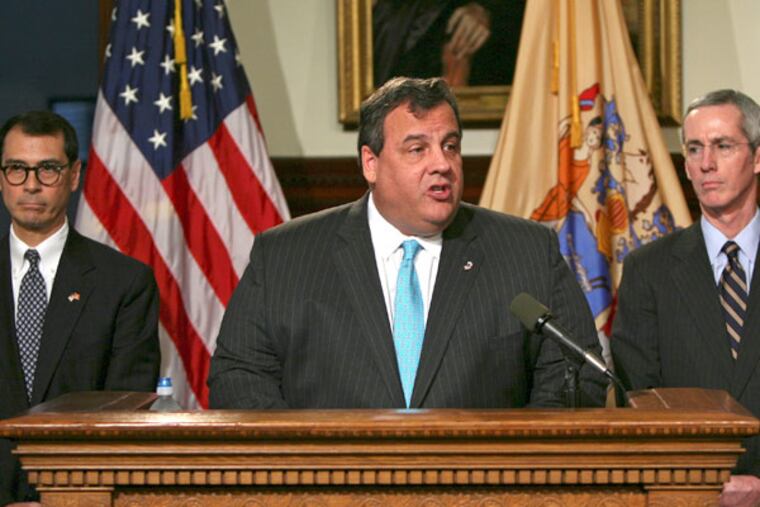Christie offers 'compromise' picks for N.J. high court
TRENTON - Gov. Christie nominated the head of the Board of Public Utilities and a Superior Court judge Monday to fill vacancies on the Supreme Court, calling his selections a "compromise" with Democrats to end a long-running stalemate over the high court.

TRENTON - Gov. Christie nominated the head of the Board of Public Utilities and a Superior Court judge Monday to fill vacancies on the Supreme Court, calling his selections a "compromise" with Democrats to end a long-running stalemate over the high court.
Robert Hanna, 56, of Madison, Morris County, worked for Christie at the U.S. Attorney's Office, where they coauthored a law journal article. As governor, Christie appointed Hanna to a top job at the Attorney General's Office and later made him president of the BPU, a cabinet position that required Senate confirmation. He is registered to vote as an independent, and donated $800 to Christie in 2009.
David Bauman, 56, of Holmdel, Monmouth County, born to a Japanese mother and American father who was serving in the Navy in Japan, is a Marine Corps veteran and a Republican who was appointed to Superior Court in Monmouth County by Democratic Gov. Jon S. Corzine. He would be the first Asian American on the Supreme Court bench.
Efforts to fill the court's vacancies have been among the most controversial aspects of Christie's term. Though the Republican governor has had success getting bills passed by the Democratic legislature, he has been stymied in his attempt to remake the court as it faces issues such as affordable housing requirements, gay marriage, and funding for schools in poor areas.
Democrats rejected Christie nominees Phillip Kwon and Bruce Harris in the spring, the first times since the modern court was established in the 1940s that gubernatorial high court nominees had been voted down. There now are five permanent justices on the panel and two appellate judges who are sitting in.
The partisan rancor began early in Christie's term, when he broke precedent by not reappointing Gloucester County's John Wallace, leaving the court without an African American judge. Democrats have demanded that Christie ensure diversity and political balance when filling vacancies.
Tradition dictates that neither party dominates the court, with four members of one party and three of another. Christie said his choices represented a compromise because if they are confirmed, there would be two Democrats, three Republicans, one independent, and one justice whose affiliation is in dispute.
"These two nominees represent a political compromise on my part, a reaching out across the aisle to Democrats in order to get our court fully staffed in the way our constitution envisioned," he said.
Most Senate Democrats were mum Monday about whether they supported the candidates. Senate President Stephen Sweeney (D., Gloucester) said in a statement that "it would be inappropriate" to comment on the candidates' merits.
Democrats are charged with interviewing and holding hearings on the nominees, but they could refuse to vote until after the gubernatorial election in November. That might give Christie ammunition to call them obstructionists, but court controversies usually don't grab the public's attention.
Christie said he did not know Bauman until his first interview with him over the summer, which lasted several hours.
But Christie knows Hanna well. In his capacity overseeing utilities, Hanna joined Christie overnight at the gubernatorial mansion at least once after Sandy. He gave the utilities an F grade for how they handled communications to 2.5 million blacked-out customers.
When Christie was the U.S. attorney for New Jersey, he and Hanna wrote an article for the American Criminal Law Review about their office's controversial use of "deferred-prosecution agreements." The settlements are used to avoid trial through mandated reforms, fines, or probation.
Specifically, Christie and Hanna wrote about why they opted for such an agreement after investigating financial malfeasance at Bristol Myers Squibb Co.
Christie and Hanna described loud and emotional disagreements among prosecutors about whether to press for an indictment. Christie "has a management style that encourages this type of lively debate," they wrote.
Kevin G. Walsh, an attorney who worked with Hanna at the U.S. Attorney's Office and later at the Gibbons law firm in Newark, called him "brilliant."
"If you think of what a Supreme Court justice ought to be with regard to temperament, smarts, and listening skills, he's right out of central casting," Walsh said.
The attorneys whom Christie last selected for the high court also were praised by their colleagues, but Democrats were unconvinced.
Harris, a gay African American and the Republican mayor of Chatham, N.J., was criticized for lacking courtroom experience. Kwon, a Korean-born independent who, like Hanna, had worked at the U.S. Attorney's Office and Attorney General's Office, was described as a stealth Republican.
The first signs of opposition to the nominees Monday came from Latinos and African Americans. If confirmed, and assuming the other justices stayed until the mandatory retirement age of 70, the state's two largest minority groups would have no representation on the court until at least 2022.
"New Jersey would go backward, not forward, in judicial diversity," said Frank Argote-Freyre, president of the Latino Action Network, who urged the Senate to reject the nominees.
Asked about that at a news conference, Christie brought up Harris.
"We had the chance to confirm an African American justice, and they turned me down," he said of the Democrats.